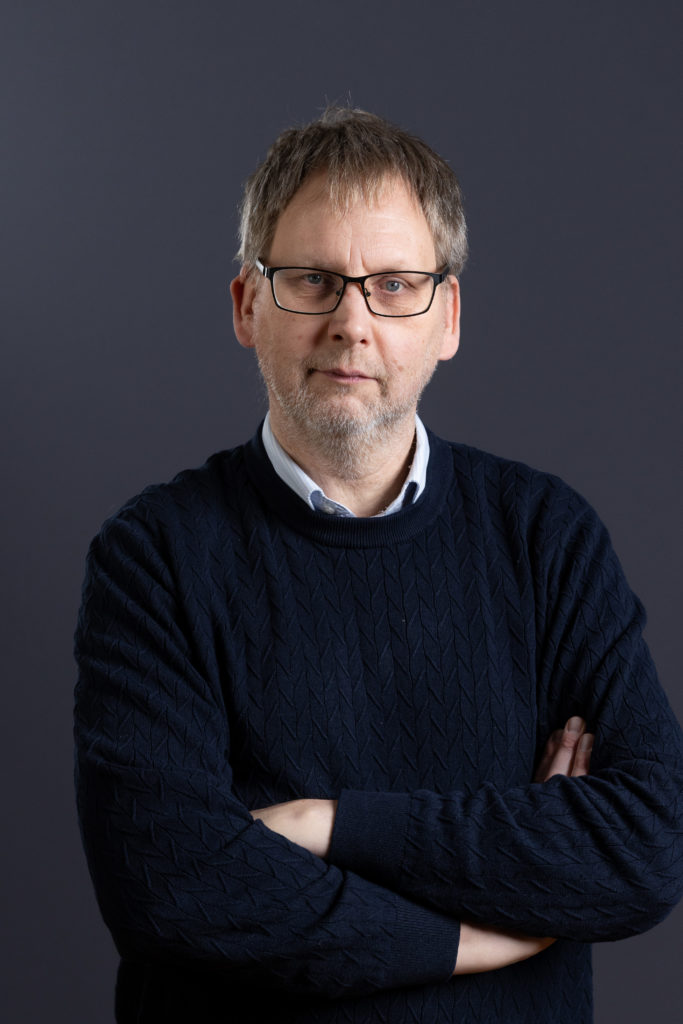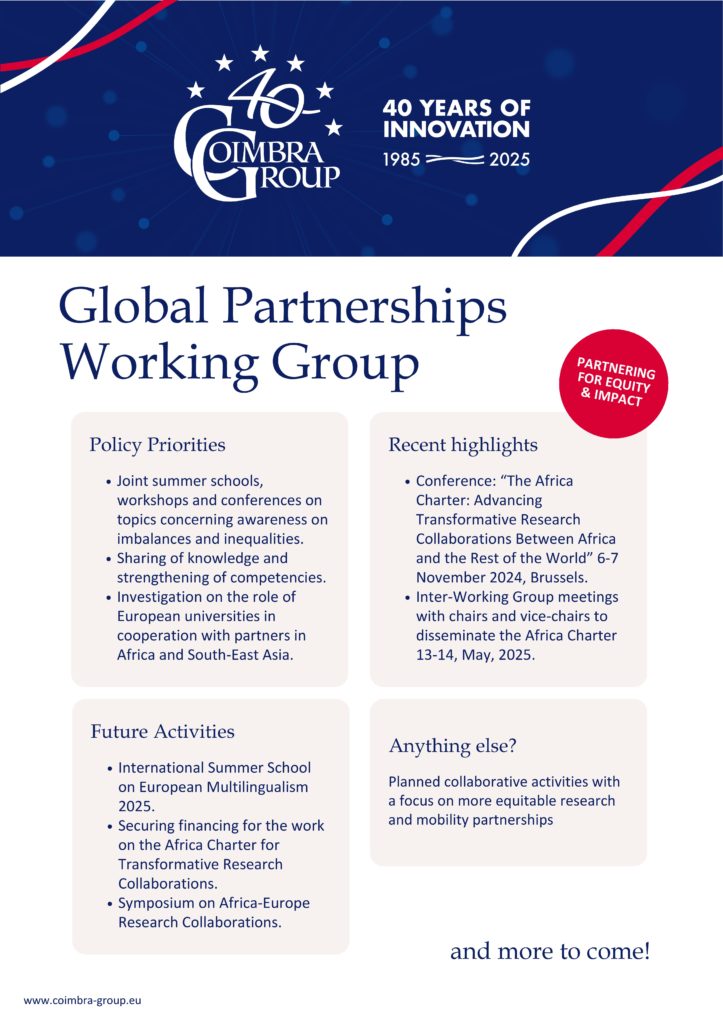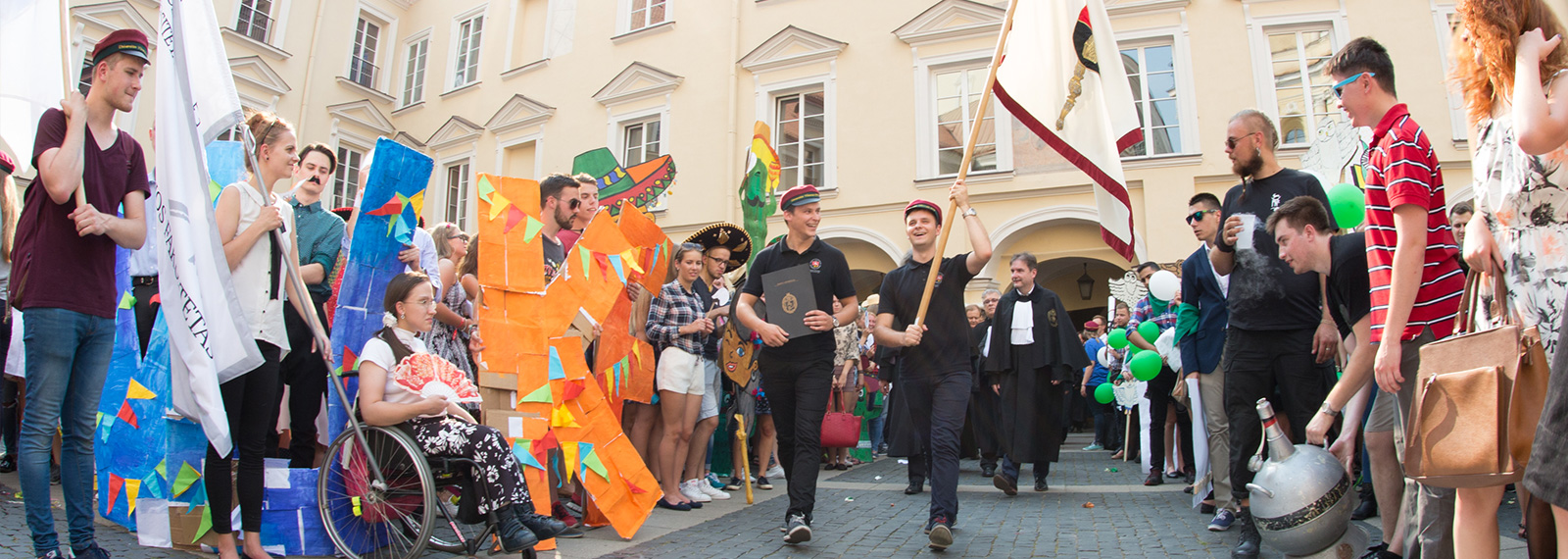Global Partnerships
Working Group
Chair: Sarah-Marleen Dannenberg

Sarah-Marleen Dannenberg is Regional Offices & DWIH Manager at the International Affairs Division of University of Cologne (UoC). She studied International Information Management with focus on Intercultural Communication at the University of Hildesheim and holds an M.Phil. in Linguistics from Trinity College Dublin. She went to California State University, Northridge and Motril, Spain for research stays. When still a student, she was an active member of the ESN network and Vice President of ESN Germany from 2013 to 2014.
Vice-Chair: Nils Gunnar Songstad

Nils Gunnar Songstad is administrative leader of Global challenges, one of the strategic prioritized areas of University of Bergen, Norway. The unit holds an annual PhD research school, established in 2008, with participants from all over the world. He holds a PhD in health systems research, and his background is in social anthropology and political science. He has extensive work experience in East Africa through development, research and research administration. His main focus is to promote collaboration between scientific disciplines in addressing global challenges, and to stimulate collaboration with the Global South based on mutual responsibilities.
Working Group Focus
The global social responsibility of Universities requires their active engagement with global cooperation issues and challenges. The Coimbra Group aims at increasing such engagements to create an effective response to major cooperation challenges and a fruitful relation with the main global partnership and development agencies, in primis the European Union (EU).
The academic world plays an important role as promoter of a broad and solid approach to global cooperation, the promotion of a global citizenship education and the implementation of a participative approach to research and for global partnerships.
The activities of the Global Partnerships Working Group align with global and European policies in the sense that they refer to actual challenges in global partnerships, especially concerning the SDGs and their implementation in decolonisation and education.
Priorities for 2025-2026
- Supporting the implementation of the Africa Charter for Transformative Research Collaborations through close collaboration with Perivoli Africa Research Centre, University of Bristol, UK.
- Implementation of joint training sessions and education programmes (e.g. summer / winter schools) to contribute to the improvements of institutional capacities, and implementation of joint training sessions and education programmes in the framework of Erasmus+ projects.
- Sharing knowledge and experiences on research for cooperation models, including a critical review of cooperation with the global majority and the actions of the main international donors.
- Investigation on the role of universities as agents of global cooperation at the country or regional level, including the co-designing of experiences of higher education fostering ownership and human and institutional partnerships.
- Development of a Global Partnerships (and eventually Coimbra Group) language policy in the context of communication on eye-level with the global majority.
Recent highlights since June 2024
- Workshop Decolonising the University, CG Annual Conference in Turku, 5 June 2024. Joint session organised by the Heritage, Latin America and Global Partnerships Working Groups with support from the Coimbra Group WGs Funding Scheme. The purpose of the workshop was to induce a profound rethinking of the colonial entanglement in academic relations through which all sides can mutually benefit.
- The third International Summer School on European Multilingualism took place at the University of Niš (Serbia) on 23-29 June 2024. The activity involved teachers from universities of Coimbra, Graz, Jena, Poitiers (project coordinator) and Salamanca. The aim of the intensive short programme on European Multilingualism and Cultural Mediation Studies was to share innovative linguistic approaches to teaching and learning languages. The programme offered courses of translation and language application in several small tandem groups: English, German, French, Portuguese, Russian and Spanish. In addition, Language Discovering Workshops enabled all participants to learn about the Less Widely Used and Lesser Taught languages (LWULT) and their important role in keeping language diversity and the world’s multilingual heritage. The Summer School offered two LWULT Workshops: Serbian and Turkish.
- Conference: The Africa Charter: Advancing transformative research collaborations between Africa and the rest of the world, in Brussels on 6-7 November 2024, with support from the Coimbra Group WGs Funding Scheme. A two-part, interactive workshop, convened jointly by the University of Bristol and the Coimbra Group Global Partnerships WG, with the support of the University of Bergen, to present and discuss the Africa Charter for Transformative Research Collaborations. The Africa Charter, co-created by Africa’s major higher education constituencies, is an Africa-centred framework for advancing a transformative mode of research collaborations that will serve to uphold the continent’s place in- and foster a more equitable- global system of scientific knowledge production. It was co-facilitated by the University of Bristol’s Perivoli Africa Research Centre. The Coimbra Group was amongst the first signatories, which now number more than 100 institutions.
- Conference: Building together: European and African Collaboration in Research and Innovation, at the University of Pavia (Italy) on 27 November 2024. The conference aimed to foster a collaborative spirit by bringing together leading professors from Africa and Europe and representatives of public institutions to explore synergies, share knowledge, and co-develop solutions to global challenges. The experts of the event included members of two important European networks, the European Association of Development Research and Training Institutes (EADI) and the Global Partnerships WG, alongside representatives from African universities.
Ongoing/forthcoming activities 2025-2026
- The fourth International Summer School on European Multilingualism will be held at the University of Coimbra, Portugal, on 22-28 June 2025. The event will involve faculty from various European universities, including those in Graz, Würzburg, Salamanca, Pavia, Poitiers, and Coimbra. The programme focuses on innovative language teaching approaches, offering courses in translation and language application in small tandem groups for languages such as German, French, Italian, Portuguese, and Spanish. Additionally, the Summer School will feature a Language Discovering Workshop highlighting Less Widely Used and Lesser Taught languages (LWULT), with special workshops on Kurdish and Romani to emphasize their role in preserving language diversity and multilingual heritage.
- Continued cooperation with the Perivoli Africa Research Centre, University of Bristol (UK) on the implementation of the Africa Charter for Transformative Research Collaborations. The Charter demands more equitable and more inclusive research relationships with higher education institutions in Africa. The Global Partnerships WG will work closely with all CG universities and other WGs to organise events to promote and disseminate knowledge on the Charter.
- Preparation of an application for COST funding together with interested CG members to advance active engagement with – and an implementation of – the principles and aspirations of the Africa Charter across disciplinary fields.
- WG sessions at the CG 2025 Annual Conference at the University of Bologna:
- University and local authorities: joint models of global partnerships and actions organised by the Global Partnerships WG and open to all delegates (11 June 2025).
- The role of universities as agents of global cooperation: the role of the recent geopolitical situation in our cooperation with the Global Majority in research and co-creation organised by both the Global Partnerships and Academic Exchange and Mobility WGs. The specifics are still being finalized (11 June 2025).
- Coimbra Group Initiative of Peace and Conflict Studies: Reimagination of the programme with new partners. The redesign is underway, with final details yet to be confirmed.
- One-day symposium on Africa-Europe research collaboration in Bergen, Norway on 3 December 2025.
- Formation of a sub-group on Climate action and Sustainability following the Coimbra Group Climate Symposium at the University of Durham, 24-26 March 2025.
Contact person at the CG Office: Catarina Moleiro (moleiro@coimbra-group.eu)



